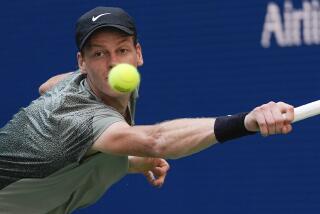U.S. OPEN : Tennis : Adams’ First Taste of Open Goes Fast
- Share via
In the stands at a cramped outside court for the first-round U.S. Open match, there were some people Chuck Adams knew could help make him rich.
Adams, 18, from Pacific Palisades, was well aware that some very important eyes were watching.
“I just got nervous,” Adams said. “Even on my serve, my toss was all over the place because of nerves.”
Ronald Agenor, a 24-year-old tour veteran from Haiti, swept Adams out of his first Open in straight sets. But for Adams, there will be a consolation prize.
He is turning pro and joining the tour only weeks after winning the United States Tennis Assn.’s national 18-and-under singles title, which earned him a wild card into the Open.
This is the same route that Michael Chang, then 15, followed in 1987. Chang, who has gone on to make $1 million a year in endorsements, is represented by the management firm that might have an inside track to Adams. “I think Chuck is a great kid and a good player with the potential to do very well,” said Advantage International’s Jeff Austin, who added that Adams is not as advanced at his age as is Chang, his top client.
Six feet and 165 pounds, Adams has a two-fisted backhand and spends most of his time on the baseline. His ranking is No. 357, based on computer points gained from playing in eight Challenger tournaments.
The small Challenger tournaments usually have prize money of $25,000 and do not count as Grand Prix results.
Adams has played one Grand Prix event, losing in the first round at Charleston, S.C. in May, but he has a wild card into the Volvo/Los Angles tournament later this month at UCLA.
So far, Adams has won $8,355, but that is without endorsement contracts for shoes, clothes or rackets.
Adams’ goal is to be ranked in the top 100 at the end of a full year.
Attention, shoppers: Hottest-selling item at the U.S. Open is a Nike poster of John McEnroe in a James Dean look-alike pose, wearing a dark overcoat while walking in a misty Times Square.
Jimmy Connors was not amused to find that Chris Evert had brought up his name in a recent magazine article.
Evert wrote in Sports Illustrated that Connors, to whom she was engaged in 1975, distracted her from winning Wimbledon that year.
Said Connors: “Number one, I wasn’t out there playing against her and she was supposed to have her situation under control at all times. That’s kind of odd for her to say.”
Evert also wrote that Connors has been unable to find a niche.
Said Connors: “I found my niche before she was born almost.”
Bjorn Borg said he hasn’t been to a tennis match since 1983, when the Swedish star abruptly quit the game.
He was in London during Wimbledon, but never went to the tournament and said it is equally doubtful that he will see any matches at the U.S. Open.
Borg, who has been in the news in recent months after reports of an attempted suicide as well as business setbacks, told Cindy Shmerler in an article written for the New York Times that his one regret is that he never won the U.S. Open.
He had his best opportunity in 1976, said Borg, when Connors won a four-set final. That was the first of Connors’ four titles, and Borg went on to lose three more finals.
As for the 1976 final at Forest Hills, Borg said if he had to pick one match that he should have won, that was it. “It’s not like a nightmare,” he said. “(But) I still miss today not winning the U.S. Open. “Since I stopped playing tennis, I haven’t had one dream about tennis,” he said. “I do dream. I dream about everything but tennis.”
The squabbling between Soviet pro players and their tennis federation has gone on long enough, according to Olga Morozova, a coach for the federation.
Morozova, who works with both Natalia Zvereva and Larisa Savchenko, said she can sympathize with the players, too, which may indicate a softening of the federation’s position.
All the Soviet players, who also include Andrei Chesnokov, Andrei Cherkasov and Alexander Volkov, are at odds with their country’s federation over the percentage of prize money they are allowed to keep.
The players say it isn’t enough and in rebellion, Zvereva signed with ProServ and Savchenko threatened to retire. “The problem is that she’s 18 years old and there is so much inside,” Morozova said. “The problem is with herself, not with the federation.”
More to Read
Go beyond the scoreboard
Get the latest on L.A.'s teams in the daily Sports Report newsletter.
You may occasionally receive promotional content from the Los Angeles Times.










